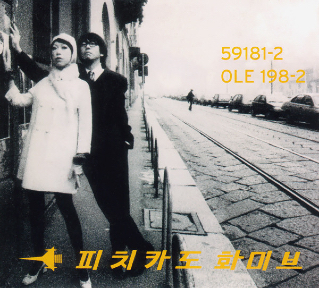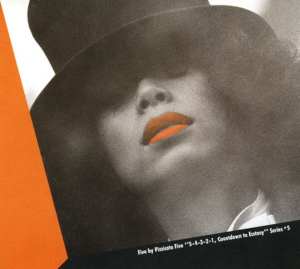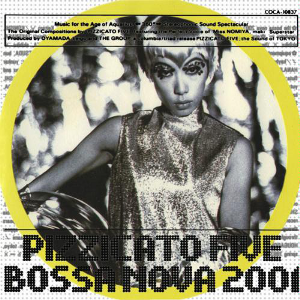Cymbals (シンバルズ) was a Japanese rock band active from 1997–2003. The trio was composed of vocalist Asako Toki (土岐麻子), bassist/guitarist Reiji Okii (沖井礼二), and drummer Hiroyasu Yano (矢野博康). Like other Japanese bands which emerged in the late 1990s, Cymbals were strongly influenced by the British pop-rock sounds of the 1960s. Due to their eclectic blend of styles, the band is often linked to Shibuya-kei. Despite solid songwriting and album production, they never scored a true "hit", which eventually resulted in the band's breakup in September 2003. They played a final 90-minute farewell concert at Shibuya O-East on January 20, 2004. The group's members remain musically active – Toki as a solo artist, Okii as a producer, and Yano as a session drummer and producer.

Shibuya-kei is a microgenre of pop music or a general aesthetic that flourished in Japan in the mid-to late 1990s. The music genre is distinguished by a "cut-and-paste" approach that was inspired by the kitsch, fusion, and artifice from certain music styles of the past. The most common reference points were 1960s culture and Western pop music, especially the work of Burt Bacharach, Brian Wilson, Phil Spector, and Serge Gainsbourg.
Fantastic Plastic Machine is the stage name of Tomoyuki Tanaka, a Japanese musician and DJ born in Kyoto, Japan. Tanaka was considered to be part of the Shibuya-kei movement.

Luxury is the second studio album by Japanese musician Fantastic Plastic Machine. It was released on September 10, 1998, by Readymade Records. The album was released in Germany on March 29, 1999, by Bungalow Records and in the United States on April 27, 1999, by Emperor Norton Records.
Yukari Fresh, is a Shibuya-kei artist.

Sound Museum is the second studio album by Japanese music producer Towa Tei, released on May 25, 1997 by East West Records. Collaborators on the album include Kylie Minogue, Biz Markie, and Bebel Gilberto.
Arling & Cameron are a Dutch electronic music duo, composed of Gerry Arling and Richard Cameron.

Chat Chat is the debut studio album by Japanese musician Takako Minekawa, released on June 25, 1995 by Polystar.

Happy End of the World (ハッピー・エンド・オブ・ザ・ワールド) is the tenth studio album by Japanese pop band Pizzicato Five. The album was released on June 21, 1997, by Readymade Records. In the United States, it was released by Matador Records on September 9, 1997, and peaked at number 32 on Billboard's Heatseekers Albums chart. A companion remix album, Happy End of You, was released in 1998. Happy End of the World was reissued by Readymade on March 31, 2006.

Fun 9 is the fourth studio album by Japanese musician Takako Minekawa. It was released on July 7, 1999 by Polystar. The album was released on November 16, 1999 in the United States by Emperor Norton Records.

Roomic Cube is the second studio album by Japanese musician Takako Minekawa. It was released on May 25, 1996, by Polystar. The album was released in the United States on February 18, 1997, by March Records.

Cloudy Cloud Calculator is the third studio album by Japanese musician Takako Minekawa. It was released on December 10, 1997 by Polystar. The album was released in the United States on November 17, 1998 by Emperor Norton Records. Minekawa played almost every instrument on the album and wrote, produced and arranged nearly all its songs.

Point is the fourth studio album by Japanese musician Cornelius. It was released in Japan on October 24, 2001, by Trattoria Records, and in the United States on January 22, 2002, by Matador Records. Point peaked at number four on the Oricon Albums Chart. The album was reissued on CD by Warner Music Japan in 2019 with a second disc containing the Five Point One music video collection.

Fantasma is the third studio album by Japanese musician Cornelius, released on August 6, 1997, on his label Trattoria. Cornelius envisioned the album as "a one-on-one experience between the music and the listener. ... It starts with you entering into the journey and ends with you returning to reality." It peaked at number six on the Oricon Albums Chart and number 37 on the UK Independent Albums Chart. Three singles were issued from the album: "Star Fruits Surf Rider", "Free Fall", and "Chapter 8 – Seashore and Horizon –".

The First Question Award (ザ・ファースト・クエスチョン・アワード) is the debut solo studio album by Japanese musician Cornelius. It was released on February 25, 1994 by Trattoria Records.

Game is the debut studio album by Japanese girl group Perfume. It was released on April 16, 2008 by Tokuma Japan Communications. Game marks Perfume's first studio album to be fully produced by Japanese producer and Capsule member Yasutaka Nakata, while Perfume contributes to the album as the lead and background vocalists.

This Year's Girl (女性上位時代) is the fifth studio album by Japanese pop band Pizzicato Five. It was released on September 1, 1991 by the Nippon Columbia imprint Seven Gods, serving as the band's first album for Nippon Columbia. This Year's Girl is the first Pizzicato Five album to feature Maki Nomiya as lead vocalist. On the album, the band augmented their Shibuya-kei sound with elements of alternative dance and began to more fully incorporate sampling into their music.

Union is the 11th studio album by Chara, which was released on February 28, 2007. It debuted at #4 on the Japanese Oricon album charts, and charted in the top 300 for 8 weeks.
Halcali Bacon (ハルカリベーコン) is the first album released by Halcali. It reached number five on the Oricon chart in Japan, and stayed on the chart for 21 weeks, making it the first album by a female hip-hop artist to enter the top ten in Japanese history. Halcali's debut album featured many well-known Japanese hiphop producers as guests, as well. Drowned in Sound's Samual Rosean, in a 2018 article on Shibuya-kei, a micro-genre of Japanese pop combining very different styles, noted that in 2003 it was a "prominent release", alongside releases by Plus-Tech Squeeze Box and Bo En.

Bossa Nova 2001 (ボサ・ノヴァ2001) is the seventh studio album by Japanese pop band Pizzicato Five. It was released on June 1, 1993 by the Nippon Columbia imprint Triad. The band co-produced the album with acquaintance and fellow Shibuya-kei artist Cornelius. Following the house music-oriented Sweet Pizzicato Five the previous year, Bossa Nova 2001 signaled a return to the band's 1960s and 1970s-influenced pop style, mixed with elements of alternative dance.














